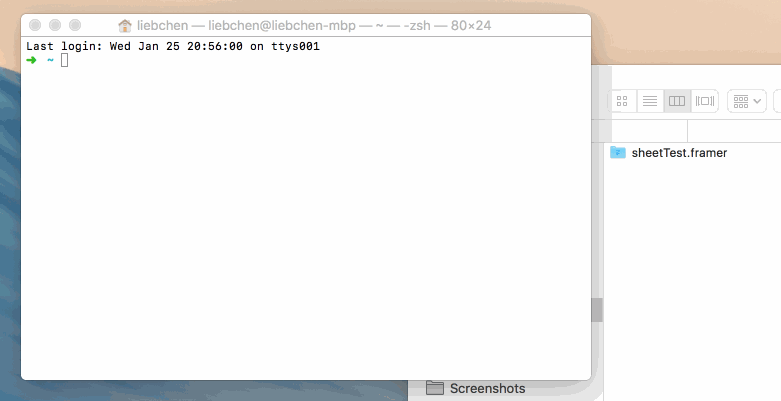Import information from Google Sheets into Framer.
- Create and save a new Framer project (if you don't have one started already)
- Download or clone this repository
- Copy
sheet.coffeeandnpm.coffeeto your/modulesdirectory - Open your Terminal, drag your framer project into the Terminal window and press enter. The path in the Terminal will update to your Framer project
- Type
npm install tabletopto get the dependency from NPM
- Import the module into your project by adding
{ Sheet } = require 'sheet'to the top of your project's code
Getting started is pretty easy. Follow the instructions above to install the module. You'll also need a Google Sheets document to import. Here's how to set up your sheet:
Go up to the File menu and pick Publish to the web. Fiddle with the options, then click Start publishing. A URL will appear, something like https://docs.google.com/spreadsheets/d/1sbyMINQHPsJctjAtMW0lCfLrcpMqoGMOJj6AN-sNQrc/pubhtml (of course, it might look a little different).
In the example URL above, you're interested in the key, which is between the /d/ and /pubhtml, so 1sbyMINQHPsJctjAtMW0lCfLrcpMqoGMOJj6AN-sNQrc. Copy this value.
In your Framer project, instantiate a new instance in your project:
{ Sheet } = require 'sheet'
sheet = new Sheet
key: '1sbyMINQHPsJctjAtMW0lCfLrcpMqoGMOJj6AN-sNQrc'Now, to actually GET the data from your sheet, call the get method:
sheet.get((data, sheet) ->
print data
)...which should print an array of objects (a collection) like...
» [{Name:"Carrot", Category:"Vegetable", Healthiness:"Adequate"},
{Name:"Pork Shoulder", Category:"Meat", Healthiness:"Questionable"},
{Name:"Bubblegum", Category:"Candy", Healthiness:"Super High"}]
Pretty cool, huh? You'll see in the example project, I've used Lodash's map to split the collection into rows which and cells for a table.
sheet.get((data, sheet) ->
_.map data, (row, i) ->
@row = new Layer
name: 'row'
parent: table
# ...
@name = new Layer
html: row.Name
name: "cell:#{row.Name}"
parent: @row
# ...This is only the beginning...what else can you think to do?
This module makes use of Tabletop.js for the heavy lifting. For more information, check out their documentation, including a section on how to format your Google Sheet.

